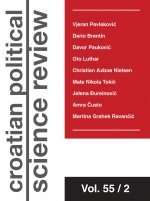Bosnia-Herzegovina and the Cultural Memory of Bleiburg
Bosnia-Herzegovina and the Cultural Memory of Bleiburg
Author(s): Amra ČustoSubject(s): Military history, Political history, WW II and following years (1940 - 1949), History of Communism, Politics of History/Memory
Published by: Fakultet političkih znanosti u Zagrebu
Keywords: Bleiburg; Bosnia-Herzegovina; Second World War; Commemorations; Memory Politics;
Summary/Abstract: This article provides a preliminary overview of the perceptions of Bleiburg among Croats and Bosniaks in Bosnia-Herzegovina, as well as its role in the overall construction of cultural memory in this deeply divided post-Yugoslav state. The author explores how the remembrance of the Second World War in socialist Yugoslavia fragmented and was replaced by new, nationalist narratives among Serbs, Croats, and Bosniaks. The memory of Bleiburg plays a central role in the victimization narrative among Bosnian Croats, and their political leadership has been deeply involved in the commemorative practices related to the events in May 1945. Bosniaks, while primarily focusing on the continuity with the antifascist Partisan tradition, have increasingly opened up the question of communist crimes such as Bleiburg, albeit through the media and memoirs and not yet systematic academic analysis. The article also examines how the Bleiburg narrative is intertwined into the memory of the war in the 1990s, and more broadly how these memory politics are used by various actors in Bosnia-Herzegovina’s deeply divided society.
Journal: Politička Misao
- Issue Year: LV/2018
- Issue No: 02
- Page Range: 111-130
- Page Count: 20
- Language: English

